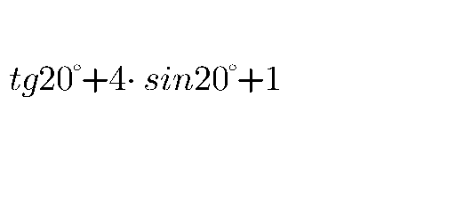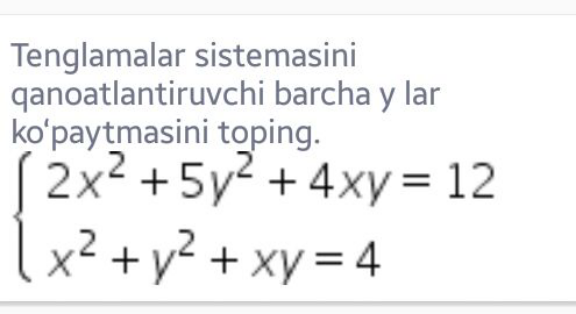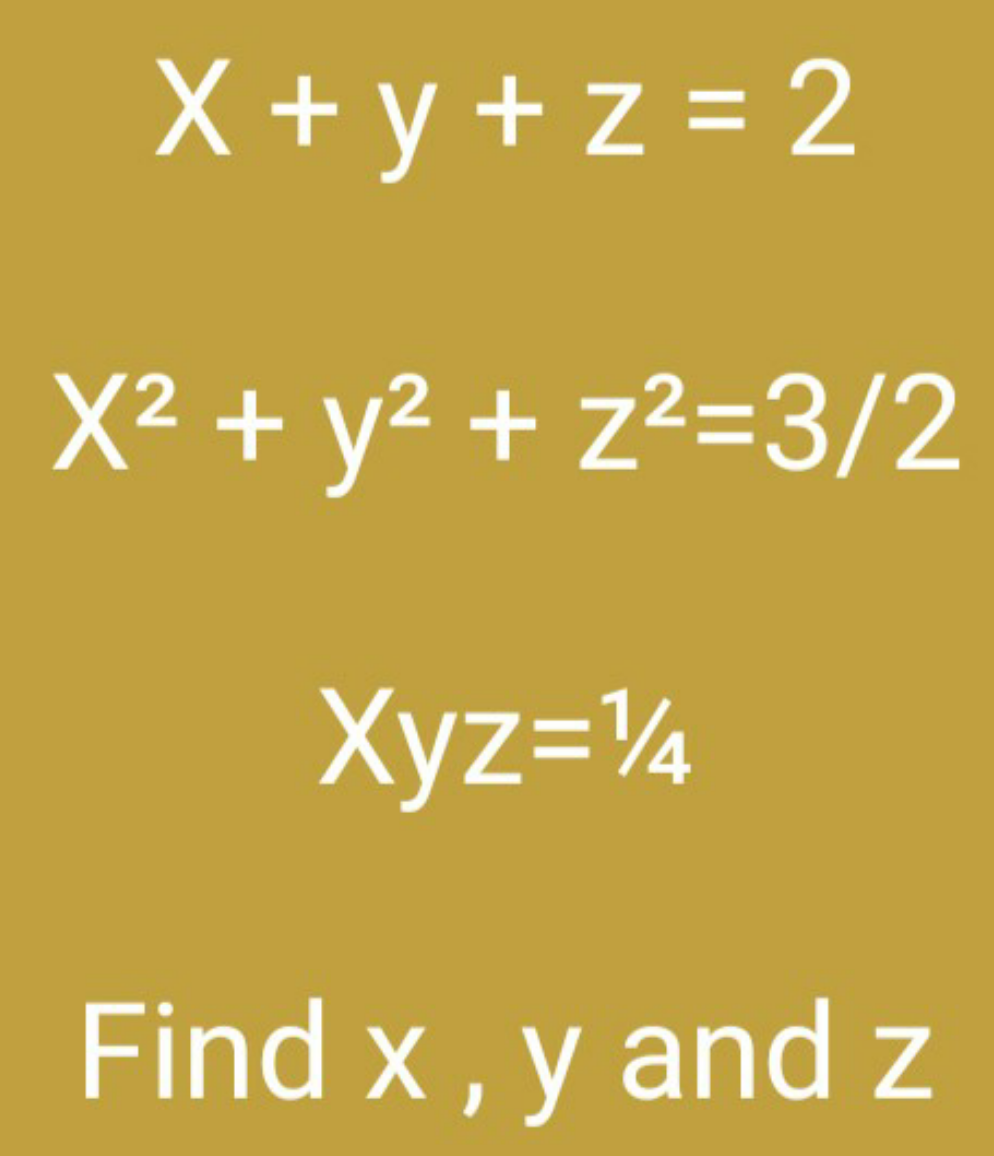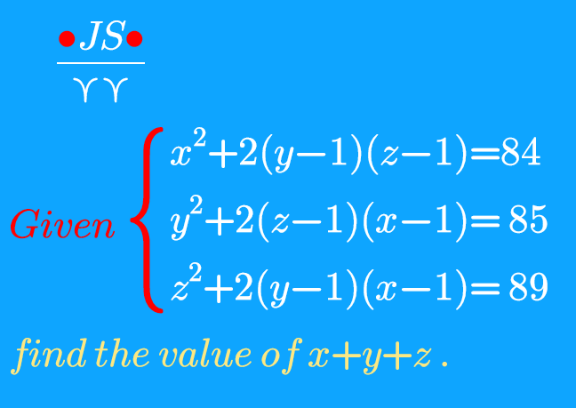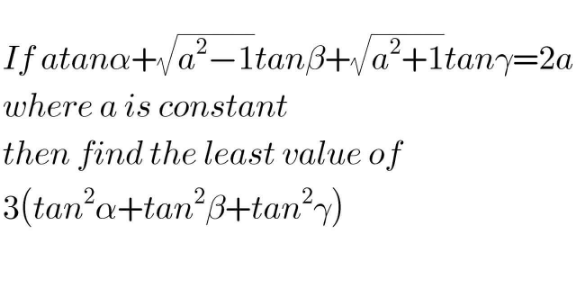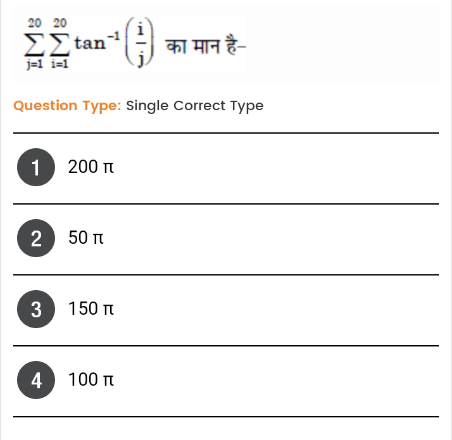|
Q108815(19/8/20)(unanswer)by 1x.x
Given f(x)=(1/( (√(1+x))))+(1/( (√(1+a))))+((√(ax))/( (√(ax+8))))
x,a∈R;x,a>0.Prove that
1<f(x)<2
Solution:Put x=tan^2 A,a=tan^2 B(A,B∈[0,(π/2))
f(x)=cosA+cosB+((tanAtanB)/( (√(tan^2 Atan^2 B+8))))
=cosA+cosB+((sinAsinB)/( (√(8cos^2 Acos^2 B+sin^2 Asin^2 B))))
Put cosA=z,cosB=y(z,y∈(0,1])we have
f=z+y+((√((1−z^2 )(1−y^2 )))/( (√(8z^2 y^2 +(1−z^2 )(1−y^2 )))))
=z+y+((√((1−z^2 )(1−y^2 )))/( (√(9z^2 y^2 +1−(z^2 +y^2 )))))
i)First we prove f(x)>1
⇔z+y+((√((1−z^2 )(1− y^2 )))/( (√(9z^2 y^2 +1−(z^2 +y^2 )))))>1(1)
If z+y≥1 then the inequality(1) is
true.Consider z+y<1.Put
m=1−(z+y)⇔z+y=1−m(0<m≤1)
z^2 +y^2 =(z+y)^2 −2zy=(1−m)^2 −2zy
(1)⇔(((1−z^2 )(1−y^2 ))/( 9z^2 y^2 +1−(z^2 +y^2 )))>[1−(z+y)]^2
⇔1+z^2 y^2 −(z^2 +y^2 )>[9z^2 y^2 +1−(z^2 +y^2 )]m^2
1+z^2 y^2 −[1−2m+m^2 −2zy]>[9z^2 y^2 +1−(1−2m+m^2 −2zy)]m^2
⇔z^2 y^2 +2zy+2m−m^2 >(9z^2 y^2 +2zy+2m−m^2 )m^2
⇔m^4 −m^2 (9z^2 y^2 +2zy+2m)+(z^2 y^2 +2zy+2m−m^2 )>0
We look at LHS as a quadratic polynomial
with respect to “im^2 ” defined on the interval(0;1)
and we denote by P(m).By the theorem
above the sign of quadratic poly.P(m)>0⇔
Δ_P =(9z^2 y^2 +2zy+2m)^2 −4(z^2 y^2 +2zy+2m−m^2 )<0
⇔81z^4 y^4 +4z^2 y^2 +4m^2 +36z^3 y^3 +36mz^2 y^2 +8mzy−4(z^2 y^2 +2zy+2m−m^2 )<0
⇔81z^4 y^4 +36z^3 y^3 +36mz^2 y^2 +8(m−1)zy+8m^2 −8m<0
⇔8m^2 +(36z^2 y^2 +8zy−8)m+81z^4 y^4 +36z^3 y^3 −8zy<0(3)
We look at LHS (3) like as a quadratic
polynomial w.r.t “m” and denote by Q(m)
We has Q(0)=81(zy)^4 +36(zy)^3 −8zy
≤81t/64+36t/16−8t=225t/64−8t<0
(due to 0< t=zy≤1/4 )
Q(1)=1+36(zy)^2 +8zy−8+81(zy)^4 +36(zy)^3 −8zy
=−7+36(zy)^2 +81(zy)^4 +36(zy)^3 ≤
−7+36/16+81/256+36/64<0 (due to zy≤1/4)
By the convert theorem above the sign
of the quadratic polynomial we infer
Q(m)>0 ∀m∈(0;1)which means P(m)
has Δ_P <0 ∀m∈(0;1)⇒the inequality (1)
proved
ii)Now we prove that f(x)<2
⇔z+y+((√((1−z^2 )(1−y^2 )))/( (√(9z^2 y^2 +1−(z^2 +y^2 )))))<2(4)
⇔(((1−z^2 )(1−y^2 ))/(9z^2 y^2 +1−(z^2 +y^2 )))<[2−(z+y)]^2
⇔1+z^2 y^2 −(z^2 +y^2 )<[9z^2 y^2 +1−(z^2 +y^2 )](1+m)^2 (note
(1−m=z+y like as above we have
−1≤m=1−(z+y)<1 as 0<z+y≤2(∗))
⇔z^2 y^2 +2zy+2m−m^2 <(9z^2 y^2 +2zy+2m−m^2 )(1+2m+m^2 )
⇔z^2 y^2 +2zy+2m−m^2 <(9z^2 y^2 +2zy+2m−m^2 )+(9z^2 y^2 +2zy)(2m+m^2 )−m^4 +4m^2 >0
⇔−m^4 +4m^2 +(9z^2 y^2 +2zy)(2m+m^2 )+8z^2 y^2 >0
⇔(9m^2 +18m+8)(zy)^2 +2(m^2 +2m)zy−m^4 +4m^2 >0(4)
We look at LHS like as a quadratic
polynomial w.r.t “zy” and denote by
H(t)(set t=zy,0<zy≤(((z+y)/2))≤1)
a)The case 9m^2 +18m+8>0
We consider the discriminant Δ_H ′of H(t)
Δ_H ′=(m^2 +2m)^2 +(9m^2 +18m+8)(m^4 −4m^2 )
=m^4 +4m^3 +4m^2 +9m^6 +18m^5 −28m^4 −72m^3 −32m^2
=9m^6 +18m^5 −27m^4 −68m^3 −28m^2
=m^2 (9m^4 +18m^3 −27m^2 −68m−28)
<0( due to ∣m∣≤1). Therefore,we
infer H(t)>0∀t∈(0;1]which means
the inequality (4)is proved ,so f(x)<2
b)The case 9m^2 +18m+8 < 0
⇔−1<m<−2/3 .We have
{ ((H(0)=−m^4 +4m^2 =m^2 (4−m^2 )>0 )),((H(1)=−m^4 +15m^2 +22m+8=)),(((1+m)(−m^3 +m^2 +14m+8)>0)) :}
By the convert theorem above the sign
of the quadratic polynomial we infer
H(t)>0 ∀t=zy∈(0;1)⇒(4)is proved
which means we ger f(2)<2
other way:
Similar to the case i)Rewrite H(t) in
the form H(m^2 )as the quadratic poly.
w.r.t “m^2 ” with the highest efficient
k=(−1)we get H(0)>0,H(1)>0
⇒kH(0)<0,kH(1)<0⇒H(m)>0
∀m^2 ∈[0,1]⇔m∈[−1,1]
From i)and ii)we obtain 1<f(x)<2(q.e.d)
|


